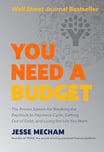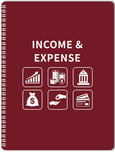
Mastering Your Finances: The Top 5 Steps to Saving Money Like a Pro
Discover the path to financial success in our latest blog, 'Mastering Your Finances: Top 5 Steps to Saving Money.' From creating budgets to investing wisely, we've got practical tips to boost your savings. Plus, find handpicked items on Amazon to support your journey. Read now and start your journey to financial freedom!
Carissa Bender
12/16/202313 min read


In a world filled with tempting purchases and endless spending opportunities, saving money can sometimes feel like an uphill battle. However, with the right strategies in place, you can take control of your finances and watch your savings grow. In this blog post, we'll explore the top 5 steps to saving money, and along the way, i'll leave some products that were helpful items for me from Amazon that can aid you on your journey to financial success.
Step 1: Create a Budget
Creating a budget is a crucial step in managing personal finances effectively, providing a roadmap for spending, saving, and achieving financial goals. Here are key reasons why creating a budget is important, along with tips to help individuals get started:
Importance of Creating a Budget:
Financial Awareness: A budget offers a clear snapshot of income and expenses, promoting awareness of where money is coming from and where it is going. This awareness is foundational to making informed financial decisions.
Expense Control: By categorizing and tracking expenses, a budget enables individuals to identify areas where they may be overspending. This awareness empowers them to make adjustments and control their spending habits.
Goal Achievement: Budgets serve as a tool for setting and achieving financial goals. Whether saving for a vacation, a down payment on a home, or paying off debt, a budget helps allocate resources toward these objectives.
Debt Management: A budget facilitates the prioritization of debt repayment. By allocating funds strategically, individuals can pay down debts faster, reducing the burden of interest and improving overall financial health.
Emergency Preparedness: Unexpected expenses are inevitable, and a budget helps build an emergency fund. Having savings set aside for unforeseen circumstances provides financial resilience and prevents the need to rely on credit during crises.
Improved Decision-Making: With a budget in place, individuals can make more informed financial decisions. Whether considering a major purchase or evaluating the affordability of a lifestyle change, a budget serves as a guide for weighing the financial implications.
Tips for Creating a Budget:
Gather Financial Information: Begin by collecting information on your sources of income, monthly expenses, and existing debts. This includes pay stubs, bills, bank statements, and any other financial documentation.
Categorize Expenses: Divide expenses into fixed and variable categories. Fixed expenses include regular bills like rent or mortgage payments, while variable expenses encompass discretionary spending like entertainment or dining out.
Set Realistic Goals: Define short-term and long-term financial goals. These may include saving for a vacation, building an emergency fund, or paying off high-interest debt. Goals provide motivation and direction for budgeting efforts.
Track Spending: Monitor actual spending against the budget regularly. This can be done through budgeting apps, spreadsheets, or financial software. Tracking expenses helps identify areas where adjustments are needed
Prioritize Saving: Allocate a portion of your income to savings, whether for emergencies, retirement, or specific goals. Treat savings as a non-negotiable part of your budget to build a strong financial foundation.
Be Flexible: Life circumstances change, and budgets should be flexible to accommodate these changes. Regularly review and adjust your budget as needed to reflect evolving priorities and financial circumstances.
Use Technology: Leverage budgeting apps and financial tools to streamline the process. Many apps categorize expenses automatically, provide spending insights, and offer alerts to help users stay on track.
Seek Professional Advice: If needed, consider consulting with a financial advisor. They can provide personalized guidance, assist in goal-setting, and offer strategies for optimizing your budget based on your unique financial situation.
In conclusion, creating a budget is a fundamental aspect of financial management. It provides clarity, control, and direction, helping individuals make informed decisions, achieve financial goals, and build a secure financial future.
Step 2: Build an Emergency Fund
Building an emergency fund is a crucial financial step that provides a safety net for unexpected expenses and financial challenges. Here's an informative description of why building an emergency fund is important, along with practical tips to help individuals establish and maintain this financial cushion:
Importance of Building an Emergency Fund:
Financial Security: An emergency fund serves as a financial safety net, offering security and peace of mind. It provides a buffer against unexpected expenses, such as medical emergencies, car repairs, or sudden job loss, ensuring that individuals can cover essential costs without resorting to debt.
Prevention of Debt Accumulation: Without an emergency fund, individuals may be forced to rely on credit cards, loans, or other forms of borrowing to address unforeseen expenses. Building an emergency fund helps prevent the accumulation of high-interest debt, which can be financially burdensome over time.
Stress Reduction: Financial stress is a significant concern for many individuals. Having an emergency fund reduces anxiety associated with unexpected financial challenges, allowing people to focus on finding solutions rather than worrying about how to pay for emergencies.
Maintaining Financial Stability: An emergency fund contributes to overall financial stability. It helps individuals weather temporary disruptions in income, providing the means to cover living expenses and maintain their standard of living during challenging periods.
Avoiding Liquidation of Investments: Without an emergency fund, individuals may be forced to sell investments or other assets at unfavorable times, such as during market downturns. An emergency fund provides a liquid and easily accessible source of funds, allowing individuals to avoid selling investments under duress.
Tips for Building an Emergency Fund:
Set a Realistic Goal: Determine the target amount for your emergency fund based on your monthly living expenses. A common recommendation is to aim for three to six months' worth of essential living expenses, but the actual amount may vary based on individual circumstances.
Start Small, Be Consistent: If saving a significant amount seems challenging, start small and gradually increase your contributions. Consistency is key, so make it a habit to set aside a portion of your income for your emergency fund regularly. A good way to start is a CASH envelope method! As a savings money challenge a lot of people find this helpful!
Create a Separate Account: Open a separate savings account specifically designated for your emergency fund. This separation makes it easier to track your progress and ensures that the funds are reserved for genuine emergencies.
Automate Savings: Set up automatic transfers from your main account to your emergency fund. Automation ensures that you consistently contribute to your fund without relying on willpower alone.
Use Windfalls Wisely: Allocate unexpected windfalls, such as tax refunds, work bonuses, or gifts, to your emergency fund. This can provide a significant boost to your savings without impacting your regular budget.
Cut Unnecessary Expenses: Evaluate your spending habits and identify areas where you can cut back on non-essential expenses. Redirect the saved money towards your emergency fund to accelerate its growth.
Prioritize Emergency Fund Contributions: Treat contributions to your emergency fund as a non-negotiable expense. Establishing a mindset that prioritizes financial security will help you consistently allocate funds to your emergency fund.
Review and Adjust: Regularly review your budget and emergency fund goals. Life circumstances and expenses may change, so adjust your savings plan accordingly to ensure that your emergency fund remains aligned with your needs.
Stay Disciplined: Building an emergency fund requires discipline and patience. Stay committed to your savings goal, and resist the temptation to dip into the fund for non-emergencies.
Celebrate Milestones: Acknowledge and celebrate milestones as you reach them. Each contribution brings you one step closer to financial security, and recognizing your progress can help reinforce positive financial habits.
In conclusion, building an emergency fund is a foundational element of sound financial planning. It provides financial security, prevents debt accumulation, and ensures that individuals are better equipped to navigate unexpected challenges. By following these tips and staying committed to the goal, individuals can establish a robust emergency fund that serves as a valuable financial resource.
Step 3: Cut Unnecessary Expenses
Trimming unnecessary expenses is a key component of effective financial management and can lead to improved financial health and increased savings. Here's a breakdown of why cutting unnecessary expenses is important, along with some practical tips to help individuals get started:
Importance of Cutting Unnecessary Expenses:
Financial Discipline: Eliminating non-essential spending requires discipline and a conscious effort to prioritize needs over wants. This discipline fosters a healthier relationship with money and encourages responsible financial habits.
Increased Savings: By reducing unnecessary expenditures, individuals can redirect money towards savings, whether for an emergency fund, retirement, or other financial goals. This can lead to greater financial security and the ability to weather unexpected expenses.
Debt Reduction: Unnecessary expenses often contribute to the accumulation of debt. Cutting back on non-essential spending frees up funds that can be allocated towards paying down debts, helping to break the cycle of debt and interest payments.
Improved Budgeting: Identifying and eliminating unnecessary expenses enhances the accuracy and effectiveness of budgeting. It allows for better allocation of resources toward essential needs, savings, and financial goals.
Stress Reduction: Financial stress is often linked to overspending and living beyond one's means. Cutting unnecessary expenses can alleviate financial stress, providing peace of mind and a sense of control over one's financial situation.
Tips for Cutting Unnecessary Expenses:
Conduct a Spending Audit: Review bank statements and receipts to identify patterns of spending. Categorize expenses into essential and non-essential categories to identify areas for potential cuts.
Prioritize Needs Over Wants: Distinguish between needs and wants. Prioritize essential expenses such as housing, utilities, and groceries over discretionary spending on non-essential items like entertainment or luxury goods.
Cut Subscriptions: Evaluate subscription services and consider canceling those that aren't regularly used or don't align with your current priorities. This may include streaming services, magazine subscriptions, or other recurring expenses.
Limit Dining Out: Eating out frequently can contribute significantly to unnecessary expenses. Consider cooking at home more often, preparing meals in advance, and limiting restaurant visits to special occasions.
Shop Mindfully: Avoid impulse purchases by creating shopping lists and sticking to them. Look for discounts, use coupons, and consider buying generic or store-brand products to save money.
Review Utility Bills: Assess utility bills and explore ways to reduce costs. This may involve energy-efficient upgrades, negotiating with service providers, or simply being mindful of energy and water consumption.
Automate Savings: Set up automatic transfers to savings immediately after receiving your paycheck. Treating savings as a non-negotiable expense can help prevent the temptation to spend unnecessary funds.
Reevaluate Lifestyle Choices: Consider reassessing lifestyle choices that contribute to unnecessary expenses. This could include downsizing to a more affordable living arrangement, exploring cost-effective transportation options, or finding alternative ways to pursue hobbies.
Educate Yourself: Stay informed about personal finance and seek resources that offer tips on frugal living. Joining online communities or reading books on budgeting and financial planning can provide additional support and ideas.
In conclusion, cutting unnecessary expenses is a proactive approach to financial management that can lead to increased savings, reduced debt, and improved financial well-being. By making conscious choices and prioritizing needs over wants, individuals can build a more sustainable and secure financial future.
Step 4: Take Advantage of Discounts and Cashback Offers
Taking advantage of discount and cash back offers is a savvy financial strategy that can lead to significant savings and enhanced purchasing power. Here's an overview of why leveraging these opportunities is important, along with some practical tips to help individuals make the most of discount and cash back programs:
Importance of Taking Advantage of Discounts and Cash Back Offers:
Increased Purchasing Power: Discounts and cash back offers allow individuals to stretch their budget, enabling them to purchase more with the same amount of money. This increased purchasing power is particularly valuable for those looking to make essential purchases or save for future goals.
Savings Accumulation: Regularly utilizing discounts and cash back programs can result in substantial savings over time. These savings can be redirected towards building an emergency fund, investing, or achieving specific financial objectives.
Debt Reduction: By saving money on everyday expenses through discounts and cash back, individuals can allocate more funds towards debt repayment. This can expedite the process of paying down debts and reduce the overall interest paid over the life of the debt.
Smart Spending: Leveraging discounts and cash back offers encourages a more strategic and intentional approach to spending. Individuals are incentivized to seek out value and make informed purchasing decisions, avoiding impulse buys and unnecessary expenditures.
Financial Flexibility: Savings from discounts and cash back offers provide a buffer against unexpected expenses or financial setbacks. This financial flexibility can contribute to a more resilient and secure financial position.
Tips for Taking Advantage of Discounts and Cash Back Offers:
Research and Comparison: Before making a purchase, research and compare prices across different retailers or service providers. Utilize online tools and apps that aggregate discounts and compare prices to ensure you're getting the best deal.
Cash Back Credit Cards: Consider using credit cards that offer cash back rewards on purchases. Be sure to pay off the balance in full each month to avoid interest charges, maximizing the benefit of the cash back feature.
Timing Purchases: Take advantage of seasonal sales, holiday promotions, and special events to make significant purchases. Planning purchases around sales events can result in substantial savings.
Stacking Offers: Look for opportunities to stack discounts and cash back offers. Some retailers allow customers to use multiple discounts or combine cash back offers with other promotions, maximizing savings.
Cash Back Apps: Explore cash back apps that offer rewards for specific purchases. These apps often partner with retailers and service providers to offer users cash back or gift cards for making qualifying transactions.
Negotiation: Don't be afraid to negotiate prices, especially for big-ticket items. In some cases, retailers may be willing to offer a discount or additional perks to close a sale.
Stay Informed: Regularly check for updates on discounts, promotions, and cash back offers. Follow retailers and brands on social media, subscribe to newsletters, and stay informed about upcoming sales events.
In conclusion, taking advantage of discount and cash back offers is a practical and effective way to optimize spending, accumulate savings, and achieve financial goals. By incorporating these strategies into your purchasing habits, you can make the most of available opportunities and enhance your overall financial well-being.
Step 5: Invest Wisely
Investing wisely is a crucial aspect of financial planning that can lead to wealth accumulation, financial security, and the achievement of long-term goals. Here's a detailed overview of why investing wisely is important, along with practical tips to help individuals navigate the world of investing:
Importance of Investing Wisely:
Wealth Accumulation: Investing provides the opportunity for wealth accumulation over time. By earning returns on investments, individuals can grow their assets and build a financial foundation that can support their goals, whether it's buying a home, funding education, or retiring comfortably.
Beat Inflation: Inflation erodes the purchasing power of money over time. Investing in assets that have the potential for returns above the inflation rate helps preserve and increase the real value of money.
Financial Security: Well-considered investments contribute to financial security by diversifying sources of income. Building a diversified investment portfolio can help protect against economic downturns and unexpected financial challenges.
Retirement Planning: Investing is a crucial component of retirement planning. Building a retirement portfolio allows individuals to generate income when they are no longer working, ensuring a comfortable and financially secure retirement.
Achieve Financial Goals: Whether it's buying a house, starting a business, or funding a child's education, investing can provide the necessary financial growth to achieve specific goals. It allows individuals to align their investment strategy with their short-term and long-term objectives.
Passive Income Generation: Some investments, such as dividend-paying stocks or real estate, can generate passive income. This income stream can provide financial stability and flexibility, especially during retirement or periods of reduced income.
Tips for Investing Wisely:
Define Your Goals: Clearly define your financial goals, both short-term and long-term. Knowing what you're investing for will help shape your investment strategy and risk tolerance.
Diversify Your Portfolio: Spread your investments across different asset classes (stocks, bonds, real estate, etc.) to reduce risk. Diversification helps mitigate the impact of poor-performing investments on your overall portfolio.
Understand Risk Tolerance: Assess your risk tolerance before investing. Different investments carry varying levels of risk, and understanding your comfort level with risk is crucial in building a portfolio that aligns with your financial goals.
Educate Yourself: Take the time to learn about different investment options, financial markets, and investment strategies. Staying informed empowers you to make well-informed decisions and adapt to changing market conditions.
Start Early: Time is a powerful factor in investing. Starting to invest early allows you to benefit from compounding returns, where your earnings generate additional earnings over time.
Regularly Contribute: Consistency is key in investing. Set up regular contributions to your investment accounts, whether it's a retirement account, brokerage account, or other investment vehicles. Regular contributions help smooth out market volatility and build wealth steadily.
Monitor and Rebalance: Regularly review your investment portfolio to ensure it aligns with your goals and risk tolerance. Rebalance your portfolio if needed, especially after significant life events or changes in financial circumstances.
Emergency Fund First: Before diving into investments, ensure you have an emergency fund to cover unexpected expenses. This helps prevent the need to liquidate investments in times of financial stress.
Consider Professional Advice: If needed, seek advice from financial professionals such as financial advisors or investment consultants. They can provide personalized guidance based on your financial situation, goals, and risk tolerance.
Stay Disciplined: Avoid making impulsive decisions based on short-term market fluctuations. Stick to your investment strategy and focus on your long-term goals. Patience and discipline are key to successful investing.
In conclusion, investing wisely is a fundamental aspect of financial planning that can lead to wealth creation, financial security, and the realization of long-term goals. By understanding your objectives, managing risk, and staying informed, you can navigate the world of investing with confidence and build a solid financial future.
By following these five steps, you'll be well on your way to mastering the art of saving money. Remember, small changes can lead to significant financial improvements over time. Financial success is within reach – start saving and building a secure future today!
So many more informative books are now on audible! if you're anything like me i live to listen to a good book especially a financial book sometimes they can get boring but listen while you're working i promise you'll get this saving and investing thing down!


One of my favorite financial books! it truly is a great read captivating while also being informative. This book is good for all types of personalities. I can promise you'll like it!
(As an Amazon Associate I earn from qualifying purchases. THIS POST CONTAINS AFFILIATE LINKS AT NO EXTRA CHARGE TO YOU. OUR FULL DISCLOSURE IS REALLY BORING, BUT YOU CAN READ IT HERE)
Contact Us
Bendercarissa221@gmail.com













